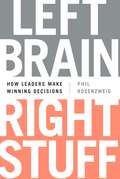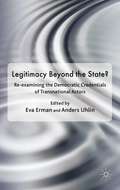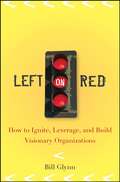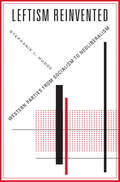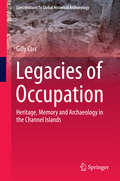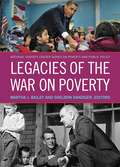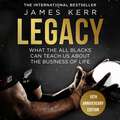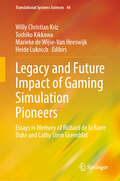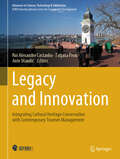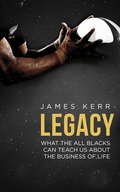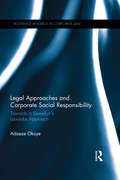- Table View
- List View
Left Behind: Latin America and the False Promise of Populism
by Sebastian EdwardsThe political and economic history of Latin America has been marked by great hopes and even greater disappointments. Despite abundant resources--and a history of productivity and wealth--in recent decades the region has fallen further and further behind developed nations, surpassed even by other developing economies in Southeast Asia and elsewhere. In Left Behind, Sebastian Edwards explains why the nations of Latin America have failed to share in the fruits of globalization and forcefully highlights the dangers of the recent turn to economic populism in the region. He begins by detailing the many ways Latin American governments have stifled economic development over the years through excessive regulation, currency manipulation, and thoroughgoing corruption. He then turns to the neoliberal reforms of the early 1990s, which called for the elimination of deficits, lowering of trade barriers, and privatization of inefficient public enterprises--and which, Edwards argues, held the promise of freeing Latin America from the burdens of the past. Flawed implementation, however, meant the promised gains of globalization were never felt by the mass of citizens, and growing frustration with stalled progress has led to a resurgence of populism throughout the region, exemplified by the economic policies of Venezuela's Hugo Chávez. But such measures, Edwards warns, are a recipe for disaster; instead, he argues, the way forward for Latin America lies in further market reforms, more honestly pursued and fairly implemented. As an example of the promise of that approach, Edwards points to Latin America's giant, Brazil, which under the successful administration of President Luis Inácio da Silva (Lula) has finally begun to show signs of reaching its true economic potential. As the global financial crisis has reminded us, the risks posed by failing economies extend far beyond their national borders. Putting Latin America back on a path toward sustained growth is crucial not just for the region but for the world, and Left Behind offers a clear, concise blueprint for the way forward.
Left Behind: The Democrats' Failed Attempt to Solve Inequality
by Lily GeismerThe 40-year history of how Democrats chose political opportunity over addressing inequality—and how the poor have paid the priceFor decades, the Republican Party has been known as the party of the rich: arguing for &“business-friendly&” policies like deregulation and tax cuts. But this incisive political history shows that the current inequality crisis was also enabled by a Democratic Party that catered to the affluent.The result is one of the great missed opportunities in political history: a moment when we had the chance to change the lives of future generations and were too short-sighted to take it.Historian Lily Geismer recounts how the Clinton-era Democratic Party sought to curb poverty through economic growth and individual responsibility rather than asking the rich to make any sacrifices. Fueled by an ethos of &“doing well by doing good,&” microfinance, charter schools, and privately funded housing developments grew trendy. Though politically expedient and sometimes profitable in the short term, these programs fundamentally weakened the safety net for the poor.This piercingly intelligent book shows how bygone policy decisions have left us with skyrocketing income inequality and poverty in America and widened fractures within the Democratic Party that persist to this day.
Left Brain, Right Stuff: How Leaders Make Winning Decisions
by Phil RosenzweigLeft Brain, Right Stuff takes up where other books about decision making leave off. For many routine choices, from shopping to investing, we can make good decisions simply by avoiding common errors, such as searching only for confirming information or avoiding the hindsight bias. But as Phil Rosenzweig shows, for many of the most important, more complex situations we face-in business, sports, politics, and more-a different way of thinking is required. Leaders must possess the ability to shape opinions, inspire followers, manage risk, and outmaneuver and outperform rivals. Making winning decisions calls for a combination of skills: clear analysis and calculation-left brain-as well as the willingness to push boundaries and take bold action-right stuff. Of course leaders need to understand the dynamics of competition, to anticipate rival moves, to draw on the power of statistical analysis, and to be aware of common decision errors-all features of left brain thinking. But to achieve the unprecedented in real-world situations, much more is needed. Leaders also need the right stuff. In business, they have to devise plans and inspire followers for successful execution; in politics, they must mobilize popular support for a chosen program; in the military, commanders need to commit to a battle strategy and lead their troops; and in start-ups, entrepreneurs must manage risk when success is uncertain. In every case, success calls for action as well as analysis, and for courage as well as calculation. Always entertaining, often surprising, and immensely practical, Left Brain, Right Stuff draws on a wealth of examples in order to propose a new paradigm for decision making in synch with the way we have to operate in the real world. Rosenzweig’s smart and perceptive analysis of research provides fresh, and often surprising, insights on topics such as confidence and overconfidence, the uses and limits of decision models, the illusion of control, expert performance and deliberate practice, competitive bidding and new venture management, and the true nature of leadership.
Left Out of the Bargain
by Ji Won Park Jeanne M. Hauch Agustin Flah Dorothee Gottwald Francisca M.U. Fernando Jacinta Anyango Oduor Marianne Mathias Oliver StolpeOver the past decade, countries have increasingly used settlements-that is, any procedure short of a full trial-to conclude foreign bribery cases and have imposed billions in monetary sanctions. There exists a gap in knowledge, however, regarding settlement practices around the world and the disposition of these monetary sanctions-notably through the lens of recovery of stolen assets. Left out of the Bargain, a study by the Stolen Asset Recovery Initiative (StAR), provides an overview of settlement practices by civil and common law countries that have been active in the fight against foreign bribery. Using the United Nations Convention against Corruption (UNCAC) as its point of reference, the study addresses concerns voiced by the international community: What happens to the money associated with the settlements, and is it being returned to those most directly harmed by the corrupt practices? And what can be done to assist those countries harmed by foreign bribery? Left out of the Bargain has found that 395 settlement cases took place between 1999 and mid-2012, resulting in a total of US$6.9 billion in monetary sanctions imposed against companies and individuals. Of this amount, nearly US$6 billion came from settlements that took place in a country different from that of the allegedly bribed foreign public officials. But only about US$197 million, or 3 percent, has been returned or ordered returned to the countries whose officials were accused of accepting bribes. Left out of the Bargain urges countries whose officials were allegedly bribed to intensify their efforts to investigate and prosecute the providers and recipients of foreign bribes, hence improving these countries' prospects for recovery of assets lost through corruption. The study also calls for more proactive international cooperation and coordination to ensure that all affected countries are afforded the opportunity to seek redress for harms suffered and for the recovery of assets-thus fulfilling the principles set out in UNCAC.
Left Parties in National Governments
by Eva Erman Anders UhlinCombining case studies with normative theory, this book analyzes the democratic credentials of transnational actors participating in global governance, ranging from corporations and philanthropic foundations to NGOs and social movements. This leads to innovative interpretations of democratic legitimacy in a transnational context.
Left on Red
by Bill GlynnIn Left on Red, venture capitalist and business innovator Bill Glynn reveals how visionary thinkers and risk-takers build great companies by doing the opposite of the expected. Today?s coolest and most successful businesses?including Google, Apple, and YouTube?were built by people who break the rules and bring radical ideas to life. If you?re an entrepreneur or an executive, this book gives you the inspiration and the guidance to bring your radical ideas to life?and change the world in the process.
Leftism Reinvented: Western Parties from Socialism to Neoliberalism
by Stephanie L. MudgeLeft-leaning political parties play an important role as representatives of the poor and disempowered. They once did so by promising protections from the forces of capital and the market’s tendencies to produce inequality. But in the 1990s they gave up on protection, asking voters to adapt to a market-driven world. Meanwhile, new, extreme parties began to promise economic protections of their own—albeit in an angry, anti-immigrant tone. To better understand today’s strange new political world, Stephanie L. Mudge’s Leftism Reinvented analyzes the history of the Swedish and German Social Democrats, the British Labour Party, and the American Democratic Party. Breaking with an assumption that parties simply respond to forces beyond their control, Mudge argues that left parties’ changing promises expressed the worldviews of different kinds of experts. To understand how left parties speak, we have to understand the people who speak for them. Leftism Reinvented shows how Keynesian economists came to speak for left parties by the early 1960s. These economists saw their task in terms of discretionary, politically-sensitive economic management. But in the 1980s a new kind of economist, who viewed the advancement of markets as left parties’ main task, came to the fore. Meanwhile, as voters’ loyalties to left parties waned, professional strategists were called upon to “spin” party messages. Ultimately, left parties undermined themselves, leaving a representative vacuum in their wake. Leftism Reinvented raises new questions about the roles and responsibilities of left parties—and their experts—in politics today.
Legacies of Occupation
by Gilly CarrThis book explores the way in which the legacy of the German occupation of the Channel Islands has been turned into heritage (or, conversely, neglected) over the last 70 years. Once seen as the 'taint of the mark of the beast', the perception of much of what the Germans left behind has slowly changed from being despised and reviled, buried underground or dumped at sea, to being reclaimed, restored, highly valued and treated as 'heritage'. This book examines the journey of various aspects of this heritage, exploring the role of each post-war generation in picking at the scar of occupation, refusing to let it heal or fade. By discovering and interpreting anew their once-hated legacy, each generation of Channel Islanders has changed the resulting collective memory of a period which is rapidly moving to the edge of living memory. It includes the first in-depth investigation into the multiple aspects of heritage of occupation of a single place and will offer comparative material for other heritage professionals who work with similar material throughout Europe and in other post-occupation areas. It will explore the complex ethical issues faced by anyone who works with the legacy or heritage of Nazism, seeking to understand how and why the Channel Islands have responded in the way that they have and asking how unique - or typical for formerly-occupied Europe - their response has been.
Legacies of the War on Poverty
by Martha J. Bailey Sheldon DanzingerMany believe that the War on Poverty, launched by President Johnson in 1964, ended in failure. In 2010, the official poverty rate was 15 percent, almost as high as when the War on Poverty was declared. Historical and contemporary accounts often portray the War on Poverty as a costly experiment that created doubts about the ability of public policies to address complex social problems. Legacies of the War on Poverty, drawing from fifty years of empirical evidence, documents that this popular view is too negative. The volume offers a balanced assessment of the War on Poverty that highlights some remarkable policy successes and promises to shift the national conversation on poverty in America. Featuring contributions from leading poverty researchers, Legacies of the War on Poverty demonstrates that poverty and racial discrimination would likely have been much greater today if the War on Poverty had not been launched. Chloe Gibbs, Jens Ludwig, and Douglas Miller dispel the notion that the Head Start education program does not work. While its impact on children's test scores fade, the program contributes to participants' long-term educational achievement and, importantly, their earnings growth later in life. Elizabeth Cascio and Sarah Reber show that Title I legislation reduced the school funding gap between poorer and richer states and prompted Southern school districts to desegregate, increasing educational opportunity for African Americans. The volume also examines the significant consequences of income support, housing, and health care programs. Jane Waldfogel shows that without the era's expansion of food stamps and other nutrition programs, the child poverty rate in 2010 would have been three percentage points higher. Kathleen McGarry examines the policies that contributed to a great success of the War on Poverty: the rapid decline in elderly poverty, which fell from 35 percent in 1959 to below 10 percent in 2010. Barbara Wolfe concludes that Medicaid and Community Health Centers contributed to large reductions in infant mortality and increased life expectancy. Katherine Swartz finds that Medicare and Medicaid increased access to health care among the elderly and reduced the risk that they could not afford care or that obtaining it would bankrupt them and their families. Legacies of the War on Poverty demonstrates that well-designed government programs can reduce poverty, racial discrimination, and material hardships. This insightful volume refutes pessimism about the effects of social policies and provides new lessons about what more can be done to improve the lives of the poor.
Legacies, Logics, Logistics: Essays in the Anthropology of the Platform Economy
by Jane I. GuyerLegacies, Logics, Logistics brings together a set of essays, written both before and after the financial crisis of 2007-08, by eminent Africanist and economic anthropologist Jane I. Guyer. Each was written initially for a conference on a defined theme. When they are brought together and interpreted as a whole by Guyer, these varied essays show how an anthropological and socio-historical approach to economic practices--both in the West and elsewhere--can illuminate deep facets of economic life that the big theories and models may fail to capture. Focusing on economic actors--whether ordinary consumers or financial experts--Guyer traces how people and institutions hold together past experiences (legacies), imagined scenarios and models (logics), and situational challenges (logistics) in a way that makes the performance of economic life (on platforms made of these legacies, logics, and logistics) work in practice. Individual essays explore a number of topics--including time frames and the future, the use of percentages in observations and judgments, the explanation of prices, the coexistence of different world currencies, the reapplication of longtime economic theories in new settings, and, crucially, how we talk about the economy, how we use stable terms to describe a turbulent system. Valuable as standalone pieces, the essays build into a cogent method of economic anthropology.
Legacies, Logics, Logistics: Essays in the Anthropology of the Platform Economy
by Jane I. GuyerLegacies, Logics, Logistics brings together a set of essays, written both before and after the financial crisis of 2007-08, by eminent Africanist and economic anthropologist Jane I. Guyer. Each was written initially for a conference on a defined theme. When they are brought together and interpreted as a whole by Guyer, these varied essays show how an anthropological and socio-historical approach to economic practices--both in the West and elsewhere--can illuminate deep facets of economic life that the big theories and models may fail to capture. Focusing on economic actors--whether ordinary consumers or financial experts--Guyer traces how people and institutions hold together past experiences (legacies), imagined scenarios and models (logics), and situational challenges (logistics) in a way that makes the performance of economic life (on platforms made of these legacies, logics, and logistics) work in practice. Individual essays explore a number of topics--including time frames and the future, the use of percentages in observations and judgments, the explanation of prices, the coexistence of different world currencies, the reapplication of longtime economic theories in new settings, and, crucially, how we talk about the economy, how we use stable terms to describe a turbulent system. Valuable as standalone pieces, the essays build into a cogent method of economic anthropology.
Legacy
by James KerrTHE 10TH ANNIVERSARY EDITIONChampions do extra. They sweep the sheds. They follow the spearhead. They keep a blue head. They are good ancestors. In Legacy, best-selling author James Kerr goes deep into the heart of the world's most successful sporting team, the legendary All Blacks of New Zealand, to reveal 15 powerful and practical lessons for leadership and business. Legacy is a unique, inspiring handbook for leaders in all fields, and asks: What are the secrets of success - sustained success? How do you achieve world-class standards, day after day, week after week, year after year? How do you handle pressure? How do you train to win at the highest level? What do you leave behind you after you're gone? What will be your legacy?
Legacy and Future Impact of Gaming Simulation Pioneers: Essays in Memory of Richard de la Barre Duke and Cathy Stein Greenblat (Translational Systems Sciences #44)
by Heide Lukosch Willy Christian Kriz Toshiko Kikkawa Marieke de Wijse-Van HeeswijkThis book is a tribute to two pioneers in the field of gaming simulation: Richard de la Barre Duke and Cathy Stein Greenblat. Duke was a professor of urban planning at the University of Michigan who introduced gaming simulation into urban planning and policy making in the early 1970s. With his 1974 book Gaming: The future&’s language, he proposed simulation games as a multilogue language for bringing different disciplines and stakeholders&’ perspectives together. He was co-founder of the International Simulation and Gaming Association (ISAGA). Cathy Stein Greenblat was a professor of sociology at Rutgers University, using gaming simulation education and health care beginning in the mid-1970s. She was editor in chief of the international journal Simulation & Gaming for many years. Duke and Greenblat worked together and authored several influential books, and both were honorary members of ISAGA until they passed away in 2022. The present book focuses on the past and actual scientific and practical impact of their work for design and development, facilitation and debriefing, evaluation, and research of simulation games. The book contains discussions and case examples of how their key concepts are still used and can be used in the future to have a social impact through gaming simulation. Furthermore, the book shows how their work and guiding simulation game design principles continue to inspire ongoing and future research in the context of dealing with complexity and to support social and environmental transition through gaming simulation- Included are interviews with the two pioneers and contributions of other outstanding experts about their work.
Legacy and Innovation: Integrating Cultural Heritage Conservation with Contemporary Tourism Management (Advances in Science, Technology & Innovation)
by Ante Mandić Rui Alexandre Castanho Tatjana PivacThis book explores the intersection of culture, sustainability, and tourism. Also, it explores the importance of integrating cultural heritage preservation, environmental sustainability, and economic considerations in the development of tourism destinations. It provides a deep understanding of how cultural tourism can be harnessed to create positive and responsible tourism experiences that benefit local communities, protect natural resources, and promote cultural diversity. Drawing upon real-world examples and case studies, this book offers practical strategies and approaches for fostering sustainable tourism practices. It examines the role of technology in enhancing cultural tourism experiences, the impact of tourism on local economies, and the preservation of cultural vitality in peripheral areas. The book also analyzes the implications of the Covid-19 pandemic on the tourism industry and explores sustainable development models for the post-pandemic era. With a multidisciplinary approach, this book is a valuable resource for tourism professionals, policymakers, researchers, and students interested in the field of sustainable tourism. It emphasizes the need for a balanced and holistic approach that considers the social, environmental, and economic dimensions of cultural tourism. By promoting cultural understanding, environmental stewardship, and inclusive community engagement, "Cultural Sustainable Tourism" paves the way for a more sustainable and responsible future in the tourism industry. This book provides a diverse range of case studies and research insights into various aspects of sustainable tourism. It offers valuable perspectives on community-based approaches, cultural preservation, the impact of the Covid-19 pandemic, destination modeling, heritage restoration, and the interconnections between tourism, media, and culture. Throughout the book, readers will find a wealth of case studies, research insights, and practical examples from around the world. These real-world examples offer valuable lessons and best practices for implementing sustainable cultural tourism initiatives. The book also encourages critical thinking and reflection, inviting readers to consider the ethical dimensions of cultural tourism, the importance of local empowerment, and the long-term sustainability of tourism practices.
Legacy of the Lions: Lessons in Leadership from the British & Irish Lions
by Peter Burns Gavin HastingsLegacy of the Lions explores leadership lessons learned in one of the most challenging environments in the sporting world: touring with the British & Irish Lions. Drawing on the author’s own experiences – and those of other tourists and managers – Gavin Hastings examines what lessons can be transferred from this elite, pressurized environment to other aspects of business and life. Based on interviews with an array of past and present greats of the game – including Sam Warburton, Warren Gatland, Brian O’Driscoll, Martin Johnson, Finlay Calder, Gareth Edwards and Willie John McBride, plus many others – Legacy of the Lions discovers what leadership lessons have been learned in one of the most pressurized environments in world sport – and how they can be made to work for you.
Legacy: A Biography of Moses and Walter Annenberg
by Christopher OgdenFrom the bestselling biographer of Pamela Digby Churchill Hayward Harriman comes a multi-generational saga of one of America's wealthiest and most controversial families--the Annenbergs.
Legacy: What The All Blacks Can Teach Us About The Business Of Life (Contemporary Security Studies)
by James KerrChampions do extra. They sweep the sheds. They follow the spearhead. They keep a blue head. They are good ancestors. In Legacy, best-selling author James Kerr goes deep into the heart of the world's most successful sporting team, the legendary All Blacks of New Zealand, to reveal 15 powerful and practical lessons for leadership and business. Legacy is a unique, inspiring handbook for leaders in all fields, and asks: What are the secrets of success - sustained success? How do you achieve world-class standards, day after day, week after week, year after year? How do you handle pressure? How do you train to win at the highest level? What do you leave behind you after you're gone? What will be your legacy?
Legacy: What The All Blacks Can Teach Us About The Business Of Life (Contemporary Security Studies)
by James KerrWhen the going gets tough, the tough start changing.Difficult times call for different solutions.In his global bestseller, Legacy, James Kerr goes deep into the heart of the world's most successful team, the New Zealand All Blacks, to help understand what it takes to bounce back from adversity and still reach the top.It is a book about leading a team or an organisation - but, more importantly, about leading a life. The kind of life that you want to lead.In today's volatile, uncertain, complex and ambiguous environment, personal leadership has never been more relevant and Legacy goes to the heart of how great leaders - and we are all leaders - 'reboot' and reframe their future.It is a truly life-defining read that addresses the big questions - values, vision, mindset and purpose - that, when answered, build the foundation for resilience, excellence and sustained success.This book will change your life.Champions do extra. They sweep the sheds, follow the spearhead, and keep a blue head. They are good ancestors and plant trees they'll never see.
Legal And Ethical Considerations For Public Relations
by Karla K. GowerPublic relations frequently reflects the conscience of an organization. Public relations professionals must ask the right questions when advising organizations on the best ways to protect themselves from damage or liability. A better understanding of ethics helps formulate those questions and educate management on the ethical consequences of corporate action.
Legal Approaches and Corporate Social Responsibility: Towards a Llewellyn’s Law-Jobs Approach (Routledge Research in Corporate Law)
by Adaeze OkoyeFrom the late 20th Century, a catalogue of high profile disasters and controversies has drawn attention to the changing relationship between corporations and society. This is taking place against the context of globalisation and this change has become the driving force for demands that corporations become socially responsible. Corporate social responsibility (CSR) has therefore emerged as a concept which attempts to encapsulate these demands for social responsibility. Yet at the heart of CSR is the debate about the role and relevance of law. This book will explore the proposition that CSR is a valid legal enquiry and will suggest a law-jobs approach which offers a potential general analytical perspective for examining such fluid concepts such as CSR in law. This approach is innovative because of the insistence of some users of CSR on placing law outside the parameters of CSR or giving it a very limited role; however, Okoye argues here that the very nature of CSR as seeking legitimacy for corporate power pushes to the fore the question of what role law can play. Law is an essential and important aspect of legitimacy and thus this work explores a legal theoretical approach that holds potential for a legal framework of CSR. This interdisciplinary book will be of great interest to students and scholars of corporate law and business studies in general.
Legal Aspects of Business
by Rajdeep Banerjee Joyeeta BanerjeeProviding a broad overview of the overlapping worlds of business and law, this textbook is an extensive guide on how different laws impact businesses. Written by practising experts, Legal Aspects of Business is an invaluable textbook for readers who want to gain a basic understanding of the intertwined worlds of law and business. The book explores multiple landmarks, as well as lesser known cases, to explain the nuances and particularities of different business laws in India. Its detailed explanations illustrated using legal precedents will help readers to understand the consequences a law can have on a business decision. The book includes updated and recent amendments as well as fresh judgements relevant to businesses. This book will prove to be a valuable companion for MBA and law students who look forward to having a comprehensive yet compact introduction to the field of law and its importance to business. Key Features: • Summaries and explanations of important Indian and foreign cases • Contains up-to-date information on amendments and their implications • Easy-to-follow discussions that do not use legal jargons • Extensive review exercises to ensure maximum retention
Legal Aspects of Corporate Management and Finance
by Jethro K. Lieberman Don Mayer Daniel M. Warner George J. SiedelMayer, Warner, Siedel and Lieberman's Legal Aspects of Corporate Management and Finance is an up-to-date textbook that covers key legal issues relating to corporate management and finance. The text is organized to permit instructors to tailor the materials to their particular approach. The authors take special care to engage students by relating law to everyday events with their clear, concise and readable style.
Legal Aspects of Crowdfunding (Ius Comparatum - Global Studies in Comparative Law #55)
by Caroline KleinerThis book offers a comparative perspective on 18 countries’ legal regulation of crowdfunding. In the wake of the financial crises of 2008, use of this alternative financing method has increased substantially, in various forms. Whereas some states have adopted tailor-made regimes in order to regulate but also encourage this way of financing projects, allowing loans to be made by non-banking institutions, others still haven’t specifically addressed the subject. An analysis of these diverse legislative stances offers readers a range of legal solutions for managing crowdfunding activities with regard to e.g. protecting investors, imposing limits on project owners, and finally the role and duties of intermediaries, i.e., companies operating crowdfunding platforms. In addition, the content presented here provides a legal basis for states and supranational organizations interested in regulating this phenomenon to achieve more legal certainty.
Legal Aspects of Cruises (Ius Comparatum - Global Studies in Comparative Law #56)
by Cecilia Fresnedo de AguirreThis book presents a comparative study on various issues regarding legal aspects of cruises – mainly, the importance of the cruise business, the impact of cruise tourism, general and specific rules applicable to cruises, liability issues, cruise passengers as consumers, package travel, labor rules for cruise workers, relevant rules on ports (e.g. on taxes, costs and rates charged to cruises in different ports), rules on the environmental impact of cruises, jurisdiction, arbitration, and choice of law in cruise contracts, and general conditions used by companies offering cruise services – in order to identify the current sources of law on these matters and determine whether or not they are appropriate and sufficient. Combining a general report with individual national reports, the book offers not only a general overview, but also the perspectives of selected jurisdictions in the Americas, Europe and Asia, namely: Argentina, Belgium, Bulgaria, Germany, Japan, Poland, Romania, Spain, Turkey, the United States, and Uruguay.
Legal Aspects of Entrepreneurship: A Conceptual Framework
by Constance E. BagleyIdentifies many of the legal issues likely to arise in the course of starting and growing a company. Suggests strategies not only for ensuring compliance with the law but also for using the law and the legal system to increase predictability, maximize value, marshal resources, and manage risk. Explains why entrepreneurs and managers cannot just rely on lawyers to deal with the legal aspects of business and offers ways to manage legal risk and handle legal disputes. Also describes the relevance of a variety of laws to managers and entrepreneurs, including intellectual property, securities regulation, taxes, contracts, employment, business organization, product liability, environment, and alternative dispute resolution.


